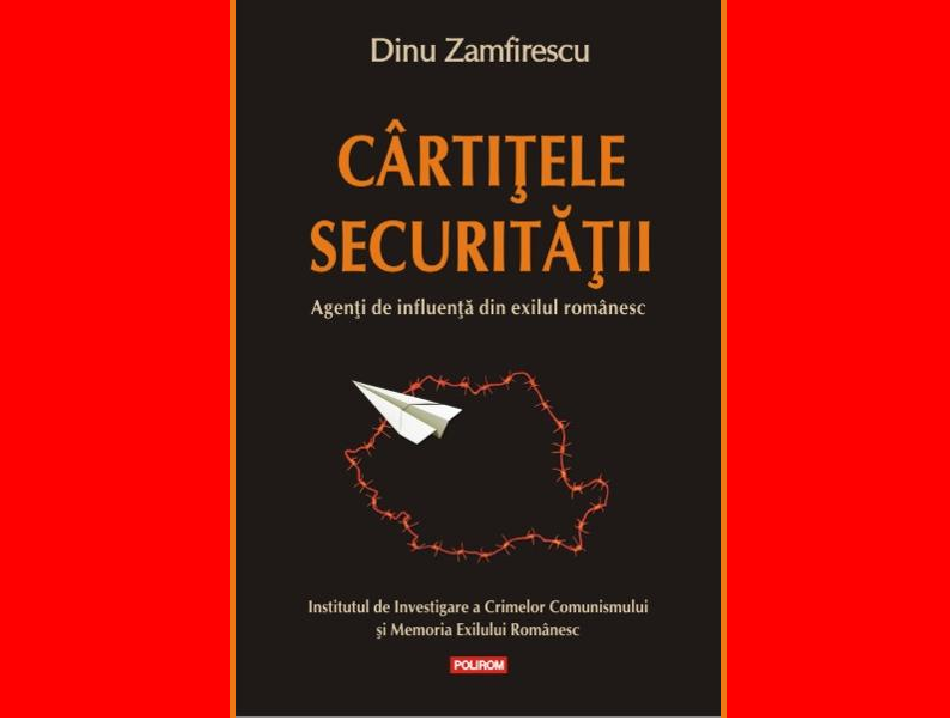Romanian exiles who collaborated with the Securitate
A new book published in Bucharest looks at Romanian exiles who collaborated with the communist secret police.

Steliu Lambru, 14.10.2013, 13:10
The repressive apparatus of the communist regime in Romania, the Securitate, terrorised Romanians for decades, whether they were within the country or outside it. A number of famous Romanians abroad were targeted by the intelligence and repressive machine of the Securitate. Important resources were used, even disproportionately, to annihilate or use various people. Recently, Dinu Zamfirescu published a book called “Securitate Informers” about Romanian exiles who collaborated with the political police.
At the event, the historian Liviu Tofan talked about how important the Romanian political refugees were for the Securitate:
“The Romanian exiles were a prime target for the Securitate, and one of its few achievements was undermining them. They aimed for the top, and were successful in several cases, managing to turn on the side of the regime in Bucharest a number of personalities living in exile. How did they manage it and what means did they use? What weaknesses did they exploit in order to turn major figures among the exiles? We have three textbook cases. One is Virgil Veniamin, an old high-ranking member of the National Peasant Party living in Paris, then there was Eftimie Gherman, a former Socialist leader, and Pamfil Seicaru, a great journalist. In addition to these three cases, the list goes on. Among the most influential people who were Securitate informers was writer Virgil Gheorghiu, the author of a book called ‘The 25th Hour’, which was also made into a Hollywood film. Ion V. Emilian, who published a journal called Stindardul in Munich, also worked for the foreign branch of the Securitate. Other such examples included the Social Democrat Duiliu Vinogradovschi Gustav Porde, the first European MP of Romanian origin, and the industrialist Iosif Constantin Dragan.”
The historian and political scientist Stelian Tanase also talked about the methods employed by the Securitate to recruit such prominent figures:
“Most often it was about money, because a lot of these people were in financial difficulty, especially in the final part of their life. Some were also blackmailed over secrets that could be used against them, either by exposing them in the press or within the community. Others yet were offered certain favours which could benefit their relatives still living in Romania, facilities such as getting a passport, or having solved issues with their properties or pensions. All these seemingly very simple methods were used in various combinations to convince someone to collaborate with the Securitate, which, for most people who had fled the country, was the worst thing imaginable.”
The Securitate started being successful among Romanian exiles in the mid-1960s. Stelian Tanase explained the change that occurred in communist Romania in 1964, leading to a change in the relationship between the authorities in Bucharest and the exiles:
“Something else happened on top of everything. If we look at the archive documents we see that the collaborators caved in in the 1960s. What was the new element emerging during that time? It was the same mechanism that makes perfectly honourable people become informers in their final year of political prison. Romania had changed its foreign policy and was indicating a break from Moscow. There was a fresh patriotic and nationalist drive and many dropped their guard. The West started considering support for the regime in Bucharest, which was seen as protecting it from Moscow. I have to say that a lot of people made out of their Securitate contributions their life’s work. Many have left veritable works of art into those files. The archives are incredible, people really put their soul into those reports.”
The historian and political scientist Daniel Barbu believes that the archives of the Securitate say a lot about human nature:
“We find out a lot about who we are as people, about our nature, about our weaknesses and vulnerabilities, about the wavering ethics that inspire us, about the pretexts that we find for ourselves to give an ethical content to things that are in the end trivial. Is there a technique that is typical of the Securitate or typical of the intelligence services in the Soviet space at large? Is there a motivating ideology behind the Securitate, or is it simply bureaucratic work, done better or worse, but typical of any such organisation? Maybe at first the Securitate was motivated by a proletarian impulse. However, in only a few years, the only preoccupation of the Securitate was to control as many levers as possible, and more and more citizens.”
Even though they lived in the free world, Romanian exiles were not spared the savagery of the communist regime, caving in and becoming collaborators of its secret police.






























